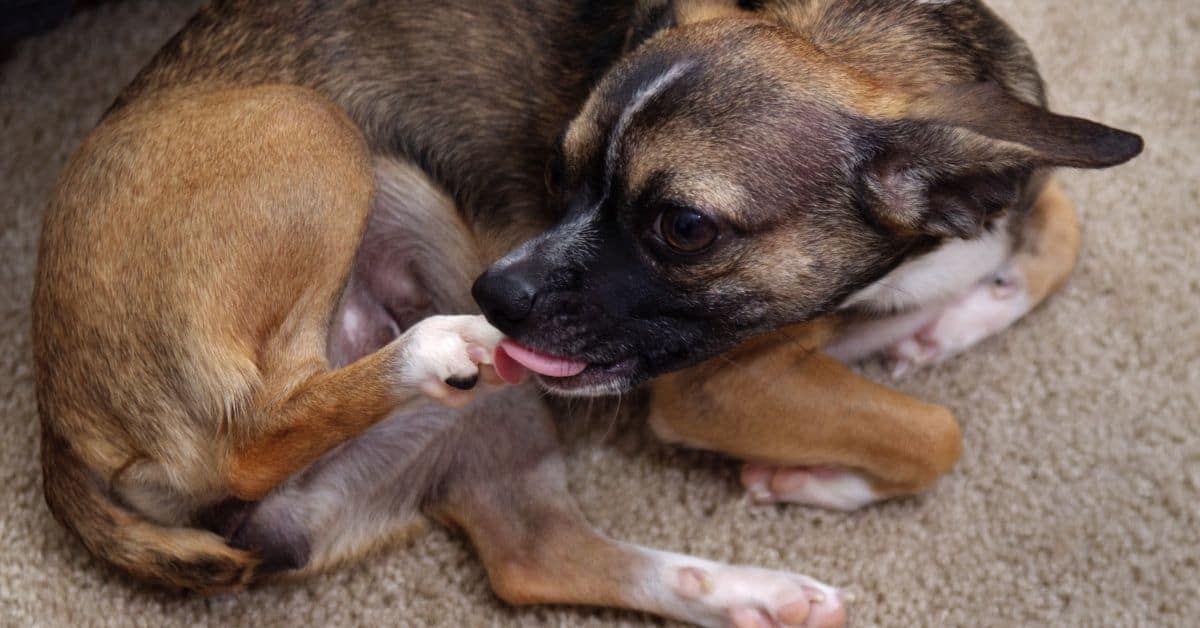Although it’s normal for dogs to lick their paws as part of routine care, you should pay attention if they start excessive paw licking; for various reasons, dogs lick their itchy paws excessively.
Finding out what is causing the behavior is the first step in getting dogs to stop licking their paws; the occasional paw licking issue can quickly be resolved by addressing this primary cause.
Dogs do sometimes lick their paws, but sometimes they also chew them.
If you want to know more about why your dog is chewing his paws, you’ll get more information here.
If the paw skin becomes infected, it can be problematic; preventing this from occurring is critical.
As you know now the answer to the question “how to stop dog from licking paws”, the following methods will assist you in determining the underlying problem which helps you to stop your dog from licking paws.
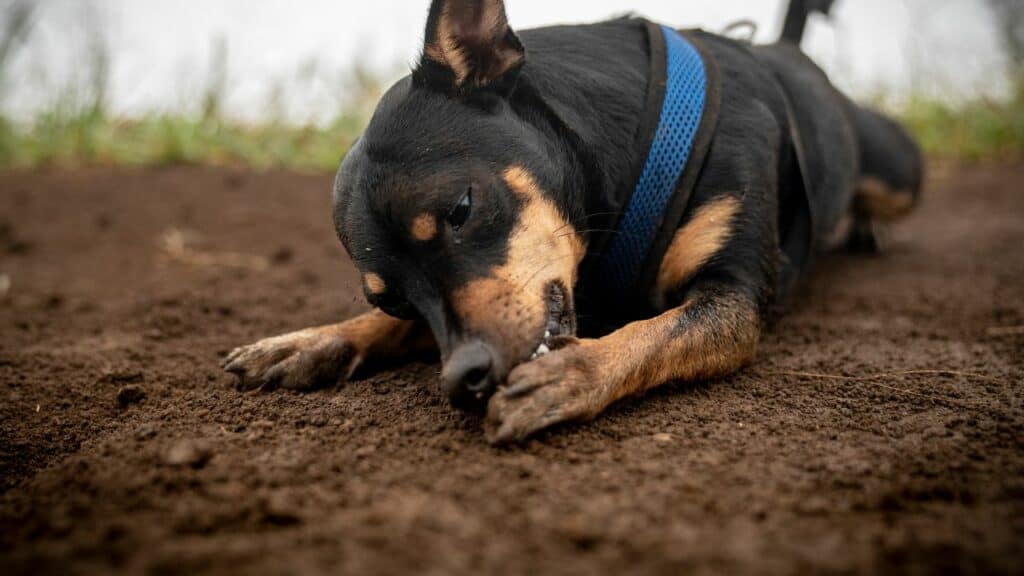
Step 1: Check For Injuries, Debris, And Bites
Checking your dog’s paw should be your first action; do you notice foreign objects like glass, pebbles, or seeds?
Is there a burr in its toes?
Your dog is likely licking the wound to clean it if the paw pad is wounded or bleeding.
Your dog probably has a dry skin condition, dog food allergies, or insect bites if the paw pad is cracked or the skin is irritated.
To ensure that all irritants are removed, rinse dirty paws with cool, clear water and then use a grooming wipe.
Step 2: Identify And Avoid Reasons For Licking Paws
Grass, trees, or recently planted shrubs may blame your dog’s itchy, irritated paws.
The best approach to determine whether a plant in your yard is causing your dog to bite and chew his paw is through intradermal skin testing performed by a veterinary dermatologist.
During a severe allergy season, foot coverings like dog shoes and socks can keep your pup’s feet clean while out and about.
Don’t lose up if your dog exhibits some spectacular goose-stepping the first time you put on his shoes because most dogs take a day or two to grow used to wearing booties.
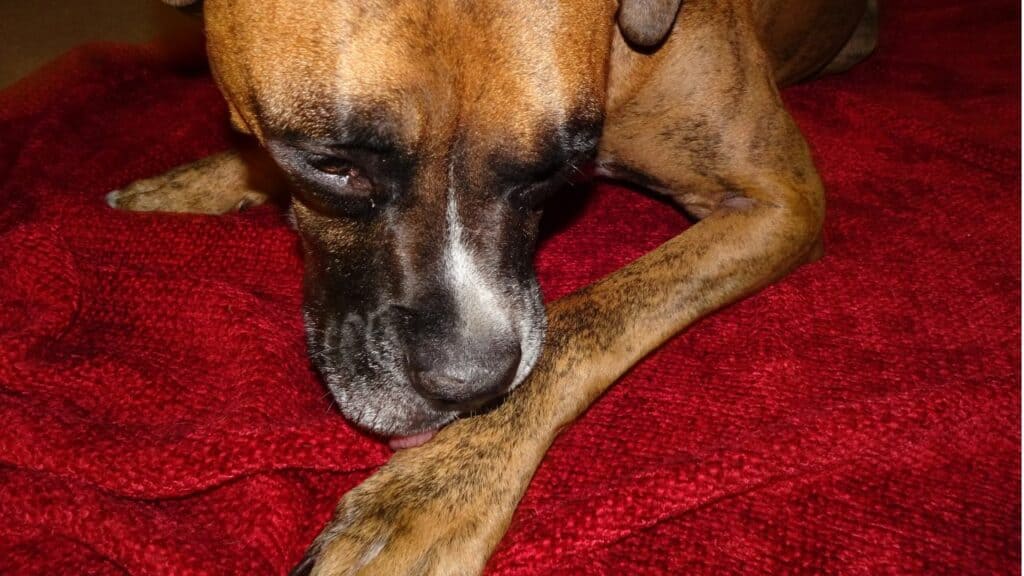
Step 3: Wash The Feet Daily
Rinse your dog’s feet twice or three times daily with warm water, especially after being outside.
You can discover a terrific tool in the pet store to complete this task quickly and easily!
Since dogs’ feet are so delicate, your dog doesn’t mind if you use a portable dog paw washer to wash them.
It’s far quicker and more effective than putting him in the bathtub, and it works much better than attempting to wash them in a dishpan!
Your dog is licking his paws primarily because of the pollen mixed in with the “dirt,” which is the leading cause!
Step 4: Wash Your Dog At Least Once A Week
Wash your dog at least once a week with glycerine soap.
Glycerine soap should be left on your dog’s skin for at least 10 minutes before you rinse it off.
Make sure you get in between her toes and wash and rinse the feet and heels of all four of her feet.
Apply a leave-on creme rinse with the topical anesthetic pramoxine after you’ve finished rinsing your dog.
Spread it on the soles between your toes and the tops of your feet.
Improve The Diet
Feeding your dog a healthy diet is one of the best things you can do for his well-being; a healthy, well-rounded diet is essential, but many more ways exist to make good dog food.
Switching to premium dog foods purchased in smaller quantities is a simple upgrade from feeding a store-brand food to storing it for months.
Instead of buying a king-sized bag and storing it in the store for months, consider purchasing a small, new bag every couple of weeks.
Stale, dry dog food isn’t good for your dog since its fats, and other nutrients quickly degrade.
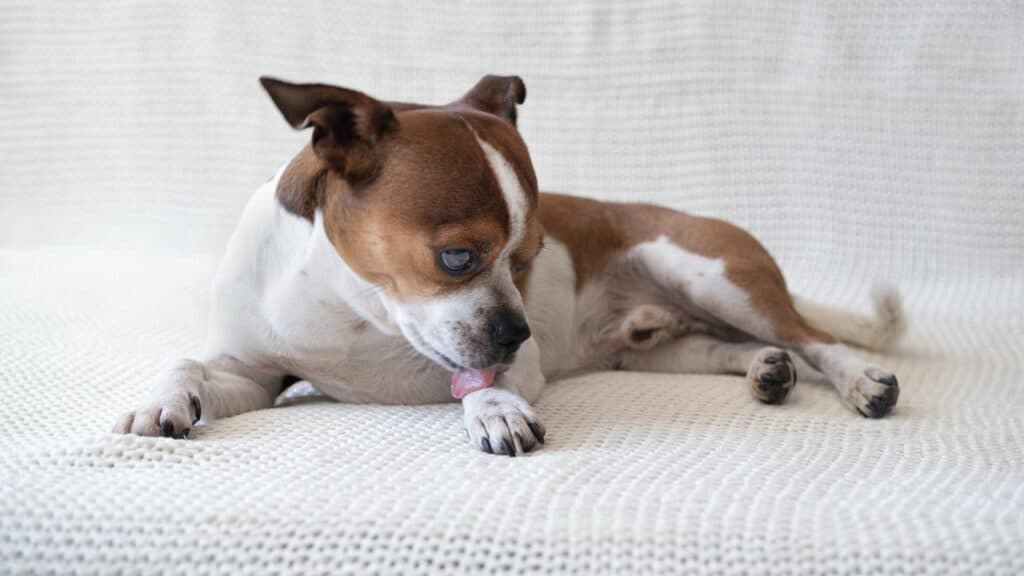
Improve Rest And Exercise Habits
The effects of stress on allergies have been the subject of several clinical research in humans and other species.
Stress may aggravate allergy symptoms in certain people, though the mechanism by which this occurs is unclear.
The outward manifestations of stress in a dog may not be directly comparable to those in a human being, but the repercussions are similar.
Most dogs’ anxiety stems from their confinement, which prevents them from engaging in natural behaviors.
Not getting enough sleep, being indoors too much, and not getting enough exercise all fall under this category.
A daily walk for your dog is essential.
Allow your dog to run free in new environments (in a safe way, of course).
Please silence all electronic devices during sleep time and turn off the lights.
Provide A Cleaner Environment
Some canines experience difficulties when exposed to dust and dust mites.
It’s recommended to wash your dog’s bedding in warm water once a month and then dry it in the sun.
You might want to do this once a week while he’s experiencing a flare-up.
At least once every week, you should vacuum or clean the floors and dust the furniture.
Don’t use anything with a strong scent, including cleaning supplies.
Why Do Dogs Lick Their Paws Raw?
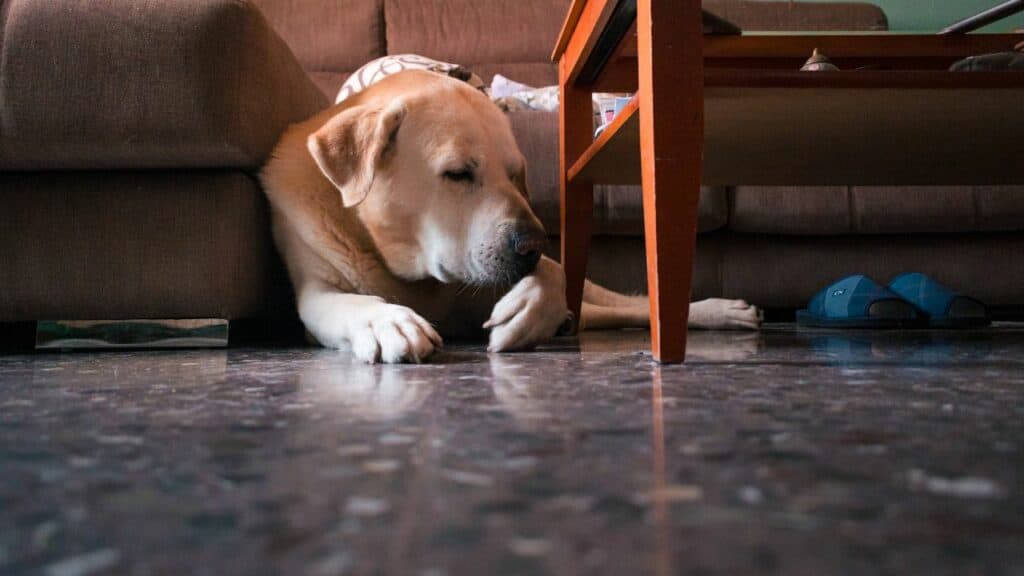
Watching your dog lose interest in everything but licking his paws can be incredibly frustrating.
In that case, what does it signify when a dog constantly licks or chews on its paws?
Dogs lick their paws to keep them clean, but excessive licking can point to health issues.
Here are the reasons why dogs do constant paw licking:
Pain
Especially if your dog is licking only one paw, the quick onset of paw licking could signify pain or irritation.
If your paw is only licking one paw, chances are good.
Insect bites, thorns, tiny cuts, embedded glass, broken nails, and torn nails are common causes of pain in that area, though they are certainly not the only ones.
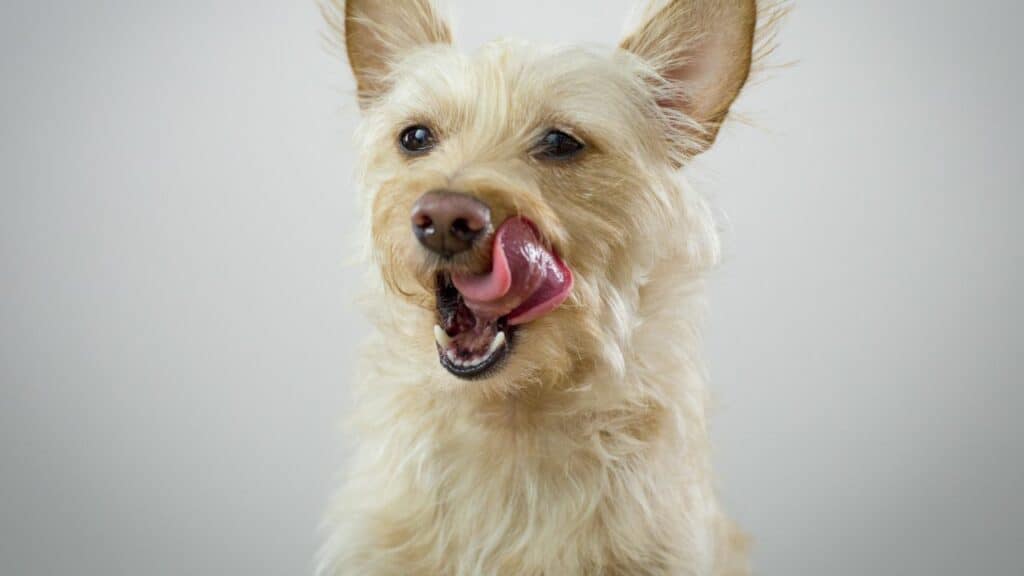
Allergy
Food allergies commonly cause compulsive licking and can be triggered by almost anything.
It might be something in the water they’re drinking, the medicine they’re taking, the weeds in your yard, the chemicals you use to clean your carpets, or even the food they’re eating.
If your dog licks its paws after a walk, it could be because of an allergy to grass or a specific weed that contains chemicals.
After every walk, wipe your dog’s paw with a damp cloth to reduce the risk of inflammation.
Gastrointestinal Issues
Dog’s paw licking signifies digestive problems.
A clinical study found that many dogs abnormally licking had gastrointestinal issues.
The researchers looked at 19 dogs showing symptoms of excessive paw licking and compared them to 10 healthy dogs.
The dogs had a series of tests done on them, including an abdomen ultrasound, an endoscopic examination, and biopsies of the stomach and duodenum.
The research revealed that 14 out of the 19 licking dogs were found to have some gastrointestinal abnormality.
Boredom
Dogs frequently leave home in a small yard—or worse, a crate—for many hours each day.
High-energy dogs may experience frustration and engage in destructive behaviors, such as excessive paw licking and chewing.
Anxiety
Dog licking paws excessively is typical behavior in anxious dogs.
Paw-licking and paw-chewing in dogs may be similar to biting one’s fingernails in humans.
Before retiring, some dogs may lick their paws constantly or even lick themselves to sleep.
In reality, it’s merely their technique of winding down and calming down.
This paw-licking is probably harmless if there is no associated redness or swelling.
Many over-the-counter remedies can calm your dog’s anxiety.
Displacement Behavior
Dogs’ paw-licking can be a form of displacement behavior.
When dogs are upset, they may act weird, a phenomenon known as displacement.
Hormonal Imbalance
When a dog’s hormones are imbalanced, it can manifest in two ways: an overabundance of cortisol (which can lead to Cushing’s illness) or a deficiency of thyroid hormone (which can cause hypothyroidism).
That can make a dog more likely to experience hair loss, bald patches, and fragile skin.
Secondary skin infections can be caused by licking these sore red spots or bald patches.
Dry Skin
Your pet’s skin might become irritated, flaky, and itchy due to allergies, dry weather with low humidity, or excessive bathing.
The presence of dandruff in your dog’s fur indicates that the dog’s skin is drying up and flaking.
The natural oils in your dog’s coat will be washed away if you give him a dog too often.
Fleas And Ticks
Extreme itching by fleas and ticks can result in compulsive dog paw licking and chewing.
If your dog has a flea allergy, the condition could worsen.
Make sure to eliminate fleas from your home and utilize insecticides and flea medications.
There are non-toxic ways to eliminate fleas and stop them from returning if your pet has an allergy to household cleaners or over-the-counter treatments.
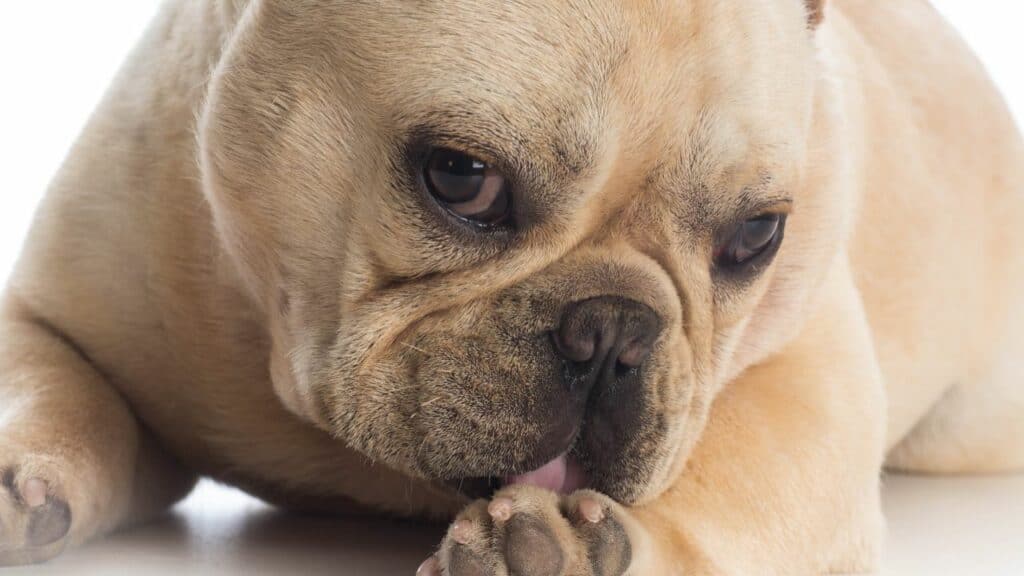
Deicing Salts
Deicing salts may be to blame if your dog only licks its paws excessively in the winter.
Your dog’s feet may become chemically burned due to the salts that melt ice on hot pavement and driveways.
Avoid places where deicing substances are being sprayed or provide your pet with boots to wear while going outside in the winter.
To wash your dog’s feet after walks and keep them from eating the harmful salts, keep a basin of warm water and a towel next to the door.
Cold Weather
Ice balls can form between hairy toes when the snow gets entangled in your dog’s fur.
It can cause painful paws symptoms like cracking, bleeding, and hair pulling.
During the winter, keep the hair between the paw pads and toes short.
Rub Crisco between the paw pads and into the fur if your dog has a lot of hair if you want to stop balls from forming.
Yeast Infection
A bad diet can be to blame if you think you have a yeast infection.
On occasion, changing your dog’s food following your veterinarian’s recommendations is the most straightforward remedy for hair loss and itching brought on by a yeast infection.
Provide high-quality foods rich in vitamins and nutrients that are good for the skin and intestines.
When To See Your Veterinarian
Contacting your veterinarian is typically a wise next move because excessive paw licking has a variety of causes.
It’s best to contact your veterinarian as soon as you observe this since a dog that licks one region or paw more than the other may be in pain.
Home Remedies That Can Help
Home cures can be highly effective without taking your dog to the veterinarian.
These natural methods can help your dog quit licking their paws excessively.
Aloe Vera Gel
Applying aloe vera gel topically can help calm irritated paw skin issues.
If your dog licks some aloe vera, it shouldn’t be harmful in little doses.
In rare instances, dogs may be sensitive to aloe vera; thus, stop using it if the skin begins to look worse after application.
Grated Cucumber
Another conventional treatment for soothing irritated skin is grated cucumber.
Grate a cucumber and apply it to the affected area twice daily for five to ten minutes.
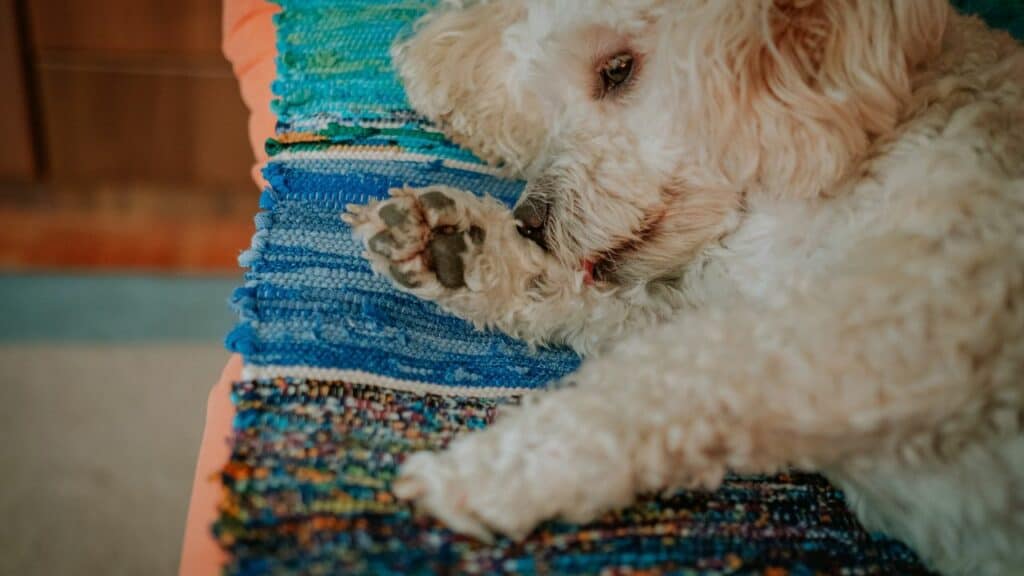
Antihistamines
In some cases, antihistamines like Benadryl may help a dog quit licking his paws.
Earlier administration of antihistamine to itchy dogs reduces the likelihood that they will require more potent medications later.
Start providing antihistamine at the first sign of dog paw licking behavior during allergy season and continue doing so regularly.
Diphenhydramine (Benadryl), cetirizine (Zyrtec), and chlorpheniramine are the antihistamines most often advised by veterinarians for dogs.
Plant Sterol Supplements
The term “plant sterols” refers to a class of organic compounds found in plants.
Plant sterols, if taken regularly, may reduce allergy symptoms caused by the environment.
Fish Oil
Utilize the pain-relieving effects of omega-3 fatty acids.
The benefits of taking fish oil supplements won’t be noticeable for at least four to eight weeks.
Start giving your pet fish oil regularly today to prevent future flare-ups.
A commercial dog meal with added omega-3 fatty acids might be another option for your pet.
Before You Go…
Now you know the answer to the question, “How to stop a dog from licking paws?”.
If you want to learn more, read the following articles too!

